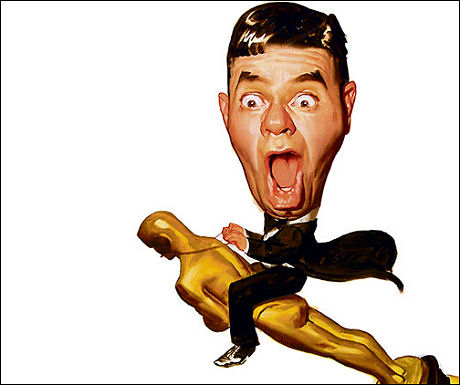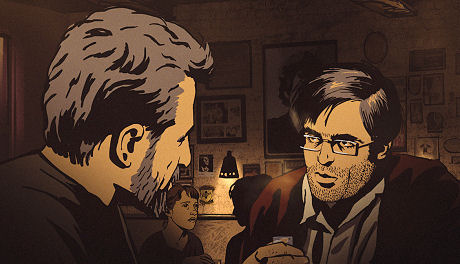Nikki Finke wrote an Oscar-disconnect piece yesterday afternoon (i.e., the gorillas aren’t watching). And, a friend writes, “the Drudge Report played it up, and every right-wing booster left a comment complaining about the movie business. Read all these comments and you will see how 47% of America feels about Hollywood and the movies. Incredible insights, very depressing, but if you’re interested in movies they’re an absolute must-read.”
 Jeffrey Wells
Jeffrey Wells
Anger Man
N.Y. Times critic Manohla Dargis knows her Jerry Lewis, all right. The remarks that Lewis will speak on tonight’s Oscar show aren’t going to bite the hand. He’s a politician, in his 80s, knows it’s his last moment in the sun. The real Lewis comes out in private, and it’s usually a humdinger. Ask Shawn Levy.

I sat down with Jerry Lewis at the ’95 Sundance Film Festival to talk about Funny Bones. The interview happened at the Stein-Erickson. Right away you could feel the testy fear-factor vibe, but I enjoy that as it sharpens your game. Several people (publicists, etc.) were sitting and standing around us in a semi-circle; it was almost like we were performing together.
A year or two earlier I’d read and enjoyed Nick Tosches‘ Dino: Living High in the Dirty Business of Dreams, so I asked Lewis if he’d read it. He had, he said, and I knew right away I’d stepped in it. The book was hurtful to a friend, he said, and that was the end of it. “Ask me something else,” he said, steam literally hissing out of his head like a radiator, “before I get pissed.” Before?
But I liked Lewis overall. He’s tough, shrewd, funny, been around, done it all, seen it all.
Of Course
I’ll be live blogging the Oscars along with everyone else. After it’s all over I’ll condense all the posts into one piece and then move on. I’m very much looking forward to the good old March-April blahs at this stage.
Answer for Obst
“Like everything else in the world, Oscar season is diminished these days,” producer Lynda Obst wrote a couple of days ago on the Atlantic site. “[And] this year’s Academy Awards are grim for a whole different set of reasons. We have no money [and] this year’s Oscar narrative offers us no clear direction out of this mess.

“Usually we clone our Best Pictures. So even though Slumdog turned out to be a major success — costing only $15 million and pulling in $88 million domestic and nearly $100 million international (and that’s before it wins best picture!) — that doesn’t mean that every studio can simply start making small, torture-meets-dance, director-oriented movies based in foreign capitals in order to turn a profit. This kind of movie’s success is just too hard to predict.
“A movie that would be perfect to model is The Dark Knight, the fabulously successful sequel to the fabulously successful Batman Returns — the second highest-grossing movie in history after Titanic, a four-quadrant blockbuster, more than $500 million domestic [and] $400 million international, a picture with real artistic merit.
“But in an apparent act of masochism, we in the Academy didn’t see fit to nominate the picture — or its enormously gifted director. What were we thinking? Did we want no one to watch the Oscar telecast? As a business that depends on the availability of credit, and that suffers as more and more bootleg copies of our DVDs are being sold for $5 on the street corners of Flatbush and Beijing, we are at the precipice of an apocalypse. The Oscar telecast is the industry’s biggest promotional opportunity of the year. But the show’s viewership depends on the audience’s familiarity with the pictures. (The Oscars got their biggest ratings ever the year that Titanic swept).
“I ask you, do we really expect to draw a crowd with The Reader? Did anyone in, say, Peoria see The Reader? Did it even open there?”
Here’s why: Earlier this week I saw three New York stage plays — Moises Kaufman‘s 33 Variations with Jane Fonda, William Shakespeare‘s A Winter’s Tale at the Brooklyn Academy of Music, and You’re Welcome, America, the George Bush satire-spoof with Will Ferrell. The first two were “theatre” and the Ferrell-Bush was Vegas. Now, there’s nothing wrong with the people who’ve been paying to see the Ferrell show (it’s a huge success) but I was there at the Cort theatre and laughing along with everyone else and — I’m just being straight about this — the people at You’re Welcome, America were a different species than the ones who paid to see 33 Variations, and they live in an entirely different hemisphere than the ones who saw Will’s world at BAM’s Harvey theatre.
We all require our measures of dignity, but everyone understands Planet of the Apes shorthand so we all understand when I say that the Ferrell audience was mostly made up of gorillas, the Fonda fans were largely chimps and the Winter’s Tale fans were mostly orangutans. There were no gorillas there, I can tell you that.
I’ve said this so many times and for so many years it’s coming out of my ears, but life is finally not worth living and movies are finally not worth seeing with any regularity if you’re going to confine yourself to a gorilla realm. (Okay, sometimes, yes — not everything has to be for the 10% of the audience with taste. I can roll with that. Sometimes plain and simple and true are okay, or even nourishing.)
90% of America doesn’t get (and doesn’t want to get) quality-level movies that are about being what they are and standing their ground regardless of how many tickets they sell. Most commercial movies are obviously about trying to reach average Americans where they live. Obviously the realms overlap from time to time, but you can’t be a creative person by reaching down. Ask anyone who’s created anything good and lasting in any realm, and I don’t mean Gallagher.
People hate elitism but it’s a stone fact that most people out there are focused on love and kids and survival and living in the rough and tumble, and therefore not into ars gratia artis. That tends to translate into a kind of laziness — not venal or punishable but real. A national mainstream populace that’s at least somewhat uncouth, poorly read in terms of hardbacks and trade paperbacks and upscale sites, insufficiently travelled, coarse, unrefined, lacking in worldliness and sophistication, uneducated in many realms. (As I certainly am.)
People of all stripes and moods have enjoyed Fargo and No Country for Old Men and The Departed and other culture-bridging films but most of them will never see, much less enjoy or cherish, the really good rarified stuff that people who’ve been to Rome and Belize and know what a good bottle of wine tastes like or know how to play good guitar tend to prefer. And I don’t mean Ballast.
You can make movies for the popcorn crowd in the right way (i.e., profitably and respectably) but without the 10% of America that gets and embraces the truly transformative, less-than-100%-commercial realms, life in America would be a desert. It would a horror.
It would have made political sense, obviously, to nominate The Dark Knight for Best Picture because it’s a very entertaining and accomplished people movie, but it just wasn’t good enough — it was a slog to sit through, it was finally too Bush-Cheney in its political thinking, and it lasted way too long. It’s one of the best superhero movies ever (superhero flicks being their own realm and arena) but it was basically a high-end gorilla thing. And Best Picture nominees are supposed to be at least chimp-level. Everyone knows that.
I was really excited when I bought the Dark Knight Blu-ray. And then I took it home and popped it in and it just wouldn’t play. Except for the Heath Ledger scenes I began to feel a little bit bored around the one-hour mark, and I wound up giving up and going back to writing. I know for a fact that a movie that doesn’t play well a second time has a Really Big Problem. Face it.
The Oscars are probably going to gradually get smaller and smaller because most of the people who genuinely care about making (or voting for) movies with a semblance of real quality know that it’s a chimp and orangutan game out there. Gorilla values are fine in their place and in the right proportion (I eat at Jack in the Box, ride a motorcycle, etc.) but they will take us down into the pit if we let them set the tone. And everyone knows this, including Lynda Obst.
Let the Oscars settle down to the cultural strata where they belong, and let them draw the audience they finally deserve to draw. You can’t make life stay the same. Money and values shift around. Live with that.
Rourke
If I had a good shot at winning this evening, as Rourke does, I’d prepare remarks that differ somewhat from all the other acceptance speeches he’s been making since the Venice Film Festival last September. Something for all the others out there stuck in a hole and dying to climb out. God smiled, I did it, so can you…no beerhall jokes, modest and self effacing.
Best Spirit Awards line: “If [other actors who may one day work with Darren Aronofsky] haven’t got the balls to bring it, fuck ’em.”
And Aronofsky, by the way, needs to get drop a couple of pounds and lose the 1950s Brooklyn-factory-owner moustache.
Howling Void
I’ve been in Connecticut for the last eight or nine hours. And I’ve read all about everything that happened today (including the Spirit Awards — congratulations, Mr. Aronofsky, Rourke, Black and Ms Leo) and I just don’t think I can add anything of interest from the frozen backwoods of Fairfield County. And I don’t care that much either. There’s that too.
Funny Dumbass Yalie
Last night I saw Will Ferrell‘s “You’re Welcome, America: A Final Night with George W. Bush” at the Cort theatre on West 48th. It’s a show for the shlubs — an extended lowbrow comedy skit with a fair amount of back-and-forth repartee between Ferrell and the audience, the sort of thing that could easily enjoy an extended run in Las Vegas. Written by Ferrell and directed by Adam McKay, it lacks depth and reflection but I laughed, dammit — loudly and often.
The best bit happened when Ferrell’s Bush asked audience members to tell him their name and occupations so he could give them a pet nickname (i.e., one of the Real McCoy’s better-known habits/tendencies). In a performance described by N.Y. Times critic Ben Brantley , a guy said he was a reviewer and Ferrell said, “Obsolete profession.” Last night he called upon a woman who said she was a nurse. “I’ll call you tits,” he said right back. A man said he was the mayor of Fort Lee, New Jersey, and Ferrell replied, “Mayor of Shittown.” That one brought down the house.
Ferrell owns it all — Bush, the frat-boy patter, the show, the audience. He knows exactly and I mean exactly what he’s doing. I enjoyed him last night more than all his screen performances combined. If you’re a tourist or someone off the bus from New Jersey you could do a lot worse than pay to see this show. It’s funny, it’s easy to get, and it doesn’t go into the ghastly horror aspects (i.e., the fact that this country was all but decimated within and without during Bush’s presidency) at all. Well, it sort of does once but only for 30 or 40 seconds. In silence.
And then the red phone rings and it’s back to the funny bullshit. “They used to call me gin and tonic,” “Awww, Brownie,” “Diego Luna,” etc.

“Determined to Enjoy It…Y’Know?”
Yesterday afternoon Nikki Finke posted this Hugh Jackman Oscar rehearsal video. “Top Hat”?
FT Guy Says So
Deadline Hollywood Daily vs. The Wrap vs. Big Hollywood. In the somewhat traditional, slightly old-school view of the Financial Times‘ Matthew Garrahan, the ultimate Hollywood blogger battle is happening between these three.
Old George Carlin Riff
Thanks to dhreck.com for the heads-up. Also available here.
Lashing Bashir
Haaretz.com’s Gideon Levy has waffle-ironed Waltz With Bashir in an psychologically exacting, very well written piece that went up sometime late yesterday. He basically says that Ari Folman‘s film lies about Israel’s heart of darkness, and particularly about its culpability in the wanton slaughter of Israel’s enemies, past and present.

“Everyone now has his fingers crossed for Ari Folman and all the creative artists behind Waltz with Bashir to win the Oscar on Sunday,” Levy begins. “A first Israeli Oscar? Why not?
“However, it must also be noted that the film is infuriating, disturbing, outrageous and deceptive. It deserves an Oscar for the illustrations and animation, but a badge of shame for its message.
“It was not by accident that when he won the Golden Globe, Folman didn’t even mention the war in Gaza, which was raging as he accepted the prestigious award. The images coming out of Gaza that day looked remarkably like those in Folman’s film. But he was silent. So before we sing Folman’s praises, which will of course be praise for us all, we would do well to remember that this is not an antiwar film, nor even a critical work about Israel as militarist and occupier. It is an act of fraud and deceit, intended to allow us to pat ourselves on the back, to tell us and the world how lovely we are.”
Final Hammond Odds
Boil the snow out of Pete Hammond‘s 2.20 Envelope piece about possible Oscar stunners, and it comes down to a closer race going on between Best Actress contenders Kate Winslet and Meryl Streep than some people realize.
“A lot of bloggers have been throwing out Melissa Leo as a threat to presumed winner Kate Winslet,” he writes. “Really? How can Kate lose? She’s on the cover of Time magazine this week so it’s over, right?”
Not necessarily, he warns, because “just as in the actor race a strong three-way contest can produce an unexpected result.
“A lot, I mean A LOT of voters have told me they went with Meryl Streep. But A LOT have said the same thing about Winslet. One guy I know voted for Melissa Leo, but apparently many voters outside of the actors branch caught up with her small indie film, Frozen River, quite late in the game even though Sony Classics got it out to the academy first back in September.
“That fresh front-of-mind factor could work in Leo’s favor. If it were just actors voting I would make Leo the front-runner. They love her and they’ve all worked with her, but it’s the entire academy voting so the main contest is Streep vs. Winslet. And don’t forget there’s a lot of academy love for Winslet’s film, The Reader. It would indeed be a stunner for me if she lost here.
“But a REALLY close vote between those two could make Leo a real, not imagined, factor.”
